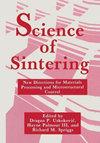磷酸钨青铜性质与布里格斯-劳舍尔振荡反应响应之间的可能联系
IF 1.4
4区 材料科学
Q3 MATERIALS SCIENCE, CERAMICS
引用次数: 2
摘要
合成了磷酸钙钨青铜(Ca-PWB),并对其进行了表征(TGA、DSC、XRPD、FTIR、SEM)。比较了固体不溶性材料Ca- PWB、掺杂锂(Li-PWB)和无阳离子磷酸钨(PWB)青铜对振荡brigs - rauscher (BR)反应动力学的影响。结果表明,Li和Ca的掺入降低了BR反应对青铜的敏感性。这些发现表明BR反应是一种测试青铜材料不同性能的创新方法。二价阳离子(Ca2+)的掺入显著改变了PWB在BR反应中的行为。青铜器不同行为的原因在于它们计算的单位胞体积。也就是说,压缩的Ca-PWB单元胞体积表明多相催化的活性位点难以获得。因此,BR示波器的线性相关(斜率)?BR反应中铜的长度(?osc)与质量的关系可以作为评价青铜催化活性的新参数。本文章由计算机程序翻译,如有差异,请以英文原文为准。
A possible connection between phosphate tungsten bronzes properties and Briggs-Rauscher oscillatory reaction response
The calcium phosphate tungsten bronze (Ca-PWB) has been synthesized and
characterized (TGA, DSC, XRPD, FTIR, SEM). The influence of solid insoluble
materials Ca- PWB, as well as lithium doped (Li-PWB) and cation free
phosphate tungsten (PWB) bronzes on the oscillatory Briggs-Rauscher (BR)
reaction dynamics, is compared. The results show that doping with Li and Ca
reduces sensitivity of the BR reaction towards bronzes addition. These
findings suggest the usage of the BR reaction as an innovative method for
testing of different properties of bronze material. The behavior of PWB in
the BR reaction is significantly changed with divalent cation (Ca2+) doping.
The reasons for the different bronzes behavior were found in their
calculated unit cell volumes. Namely, the compressed Ca-PWB unit cell volume
indicates the difficult availability of the active site for heterogeneous
catalysis. Hence, the linear correlation (slope) of the BR oscillogram?s
length (?osc) vs. mass of bronze in BR reaction might be considered as a new
parameter for the evaluation of the bronzes catalytic activity.
求助全文
通过发布文献求助,成功后即可免费获取论文全文。
去求助
来源期刊

Science of Sintering
工程技术-材料科学:硅酸盐
CiteScore
2.50
自引率
46.70%
发文量
20
审稿时长
3.3 months
期刊介绍:
Science of Sintering is a unique journal in the field of science and technology of sintering.
Science of Sintering publishes papers on all aspects of theoretical and experimental studies, which can contribute to the better understanding of the behavior of powders and similar materials during consolidation processes. Emphasis is laid on those aspects of the science of materials that are concerned with the thermodynamics, kinetics and mechanism of sintering and related processes. In accordance with the significance of disperse materials for the sintering technology, papers dealing with the question of ultradisperse powders, tribochemical activation and catalysis are also published.
Science of Sintering journal is published four times a year.
Types of contribution: Original research papers, Review articles, Letters to Editor, Book reviews.
 求助内容:
求助内容: 应助结果提醒方式:
应助结果提醒方式:


